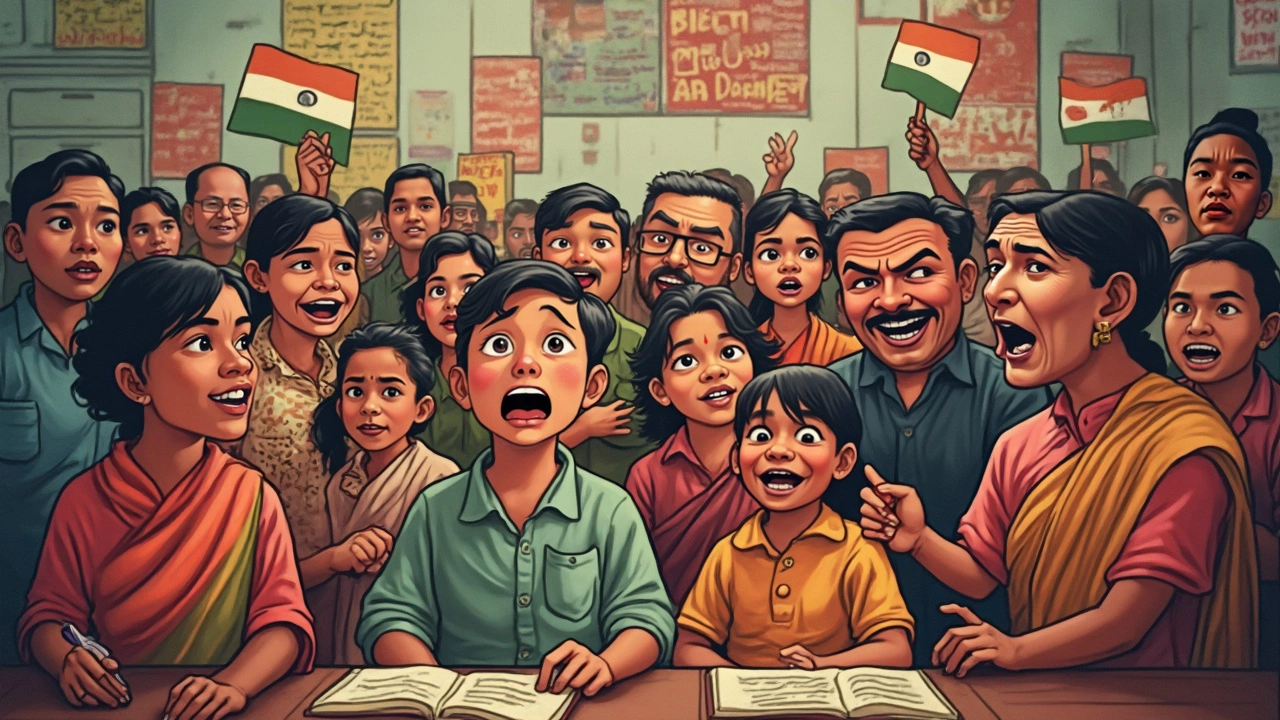Which Medical Specialty Is the Hardest to Become? - NEET Coaching Guide

NEET Medical Specialty Hardness Calculator
Find Your Ideal Specialty
Enter your NEET UG score (0-720) to see which specialties you're competitive for and how difficult they are to enter.
What This Means for Your Career
Choosing a medical specialty is a marathon, not a sprint. Your NEET score determines which specialties are within reach, but remember that passion, research experience, and mentorship can significantly improve your chances of success.
Key Takeaways
- 700+ NEET UG score gives you access to most top specialties
- 720+ is required for the most competitive specialties like Neurosurgery
- Competition index is a key factor: the higher the ratio of applicants to seats, the harder it is to get in
Next Steps
- Book a free demo with a NEET coaching center that offers a "hard-specialty track"
- Register for at least three mock NEET UG tests each month
- Apply for summer internships in tertiary hospitals
Quick Takeaways
- The toughest specialties usually combine ultra‑high competition, longest training, and demanding lifestyle.
- Neurosurgery, cardiothoracic surgery, and oncology top the list for most aspirants.
- NEET UG scores above 700 (out of 720) are virtually mandatory for these fields.
- Early exposure, research publications, and strong mentorship can shave years off the journey.
- Balancing passion with realistic work‑life expectations prevents burnout later on.
Ever wondered which hardest medical specialty you’d need to chase if you’re eyeing a spot in an elite hospital? The answer isn’t a single name; it’s a blend of cut‑throat entrance exams, years of residency, and grueling on‑call schedules. Below we break down the exact factors that make certain doctor paths feel like climbing Everest, and we show how NEET coaching can give you a foothold.
What Is a Medical Specialty?
Medical specialty is a distinct branch of medicine where doctors focus their training and practice on a particular organ system, disease group, or patient population. Choosing a specialty shapes every aspect of your career-from the length of your postgraduate training to the income bracket you’ll eventually land in. In India, the selection process starts with the NEET UG exam, followed by entrance tests for postgraduate courses (NEET PG, AIIMS PG), making the early score a gatekeeper for the hardest routes.
How Do We Measure “Hardness”?
Hardness isn’t a single number; it’s a mix of four measurable criteria:
- Competition Index: Number of seats vs. number of aspirants. A higher ratio means tougher odds.
- Training Duration: Total years from MBBS to final fellowship. Longer pathways increase fatigue and financial strain.
- Workload Intensity: Average weekly on‑call hours, emergency duties, and procedural volume.
- Lifestyle Impact: Burnout rates, average age of retirement, and flexibility for personal life.
By scoring each specialty on these metrics, we can rank them objectively.
Top Contenders for the Hardest Specialty
Below are the specialties that consistently score highest across the four criteria. Each entry includes a brief overview, typical training timeline, and why it’s considered a marathon.
- Neurosurgery focuses on surgical treatment of disorders of the brain, spine, and peripheral nerves. - Training: MBBS (5.5 yrs) + MS Neurosurgery (3 yrs) + Fellowship (1-2 yrs). Competition: 1-2 % acceptance rate for NEET PG. Workload: 80-100 hrs/week during residency; high on‑call frequency.
- Cardiothoracic Surgery deals with surgical procedures of the heart, lungs, esophagus, and other thoracic organs. - Training: MBBS + MS (General Surgery) (3 yrs) + M.Ch. Cardiothoracic (3 yrs). Competition: Seats limited to elite institutes; NEET PG score > 720 needed.
- Oncology encompasses medical, surgical, and radiation treatment of cancer. - Training: MBBS + MD (General Medicine) (3 yrs) + DM (Medical Oncology) (3 yrs) or M.Ch. (Surgical Oncology). Workload: Long clinic hours, research commitments, and emotionally taxing patient outcomes.
- Radiology uses imaging technologies (X‑ray, CT, MRI, PET) to diagnose and sometimes intervene. - Training: MBBS + MD (Radiology) (3 yrs) + Fellowship (1 yr). Competition: High NEET PG cut‑off, especially for AIIMS and PGI.
- Orthopedic Surgery addresses musculoskeletal injuries, deformities, and degenerative diseases. - Training: MBBS + MS (Orthopedics) (3 yrs). Workload: Physically demanding surgeries, emergency trauma calls.
- Nephrology specializes in kidney function, dialysis, and transplant medicine. - Training: MBBS + MD (General Medicine) (3 yrs) + DM (Nephrology) (3 yrs). Competition: Moderate but intense research expectations.
- Dermatology focuses on skin, hair, and nail disorders. - Training: MBBS + MD (Dermatology) (3 yrs). Competition: Surprisingly high; NEET PG cut‑off often > 680 due to lifestyle appeal.

Comparison Table: Hardness Metrics
| Specialty | Competition Index (Seats/Applicants) | Training Years (Post‑MBBS) | Avg Weekly Hours (Residency) | Burnout Rate % |
|---|---|---|---|---|
| Neurosurgery | 1/120 | 7‑9 | 80‑100 | 55 |
| Cardiothoracic Surgery | 1/100 | 8‑10 | 75‑90 | 60 |
| Oncology (Medical) | 1/85 | 9‑11 | 70‑85 | 50 |
| Radiology | 1/70 | 6‑8 | 50‑65 | 30 |
| Orthopedic Surgery | 1/95 | 7‑9 | 70‑85 | 45 |
| Nephrology | 1/55 | 9‑11 | 55‑70 | 35 |
| Dermatology | 1/80 | 6‑8 | 40‑55 | 20 |
Why NEET Scores Matter
The National Eligibility cum Entrance Test (NEET) is the single gateway for MBBS seats and, indirectly, for specialty choices. A higher percentile not only guarantees an MBBS seat in a top government college but also boosts your chance to land a coveted internship, research project, or mentorship-each of which adds points in the NEET PG counseling.
For the hardest specialties, the typical NEET UG cut‑off is 680‑720. NEET PG cut‑offs rise even further: Neurosurgery and cardiothoracic often require scores above 720, while radiology and dermatology sit around 680‑690. Coaching institutes that focus on high‑yield biochemistry, pathology, and clinical scenario practice can shave off precious marks.
How to Prepare for the Hardest Paths
- Start Early: Aim for a NEET UG score > 700 by 12th grade. Begin mock tests in 11th grade to identify weak spots.
- Strategic Coaching: Enroll in a NEET coaching program that emphasizes problem‑solving speed, not just rote memorization.
- Research Experience: Join a hospital’s research wing; publications boost your NEET PG profile.
- Mentorship: Find a senior resident or professor in your target specialty. Their guidance on case discussions is gold.
- Physical & Mental Fitness: Long surgeries demand stamina. Regular exercise and mindfulness reduce burnout risk.

Common Myths About “Hard” Specialties
Myth 1: You need a perfect score to enter. Reality: While top scores improve odds, a strong extracurricular profile and good interview performance can compensate for a few points.
Myth 2: Hard specialties pay more. Reality: Salaries are comparable across many streams; lifestyle and job satisfaction differ vastly.
Myth 3: You can’t switch later. Reality: Many doctors pivot after a few years of practice, especially if they pursue a DNB or FMGE route.
Quick Checklist Before You Choose
- Do you enjoy high‑pressure, hands‑on procedures?
- Can you sustain 70+ hrs/week during residency?
- Is your NEET score at least 680 (UG) and 700 (PG) for your target?
- Do you have a support system for mental health?
- Are you prepared for at least a decade of training before stable income?
Next Steps If You’re Set on a Tough Specialty
1. Book a free demo with a NEET coaching center that offers a “hard‑specialty track.”
2. Register for at least three mock NEET UG tests each month.
3. Apply for summer internships in tertiary hospitals-especially in the department you aim for.
4. Start a study group focusing on high‑yield clinical scenarios.
5. Keep a journal of your stress levels; adjust study plans before burnout sets in.
Frequently Asked Questions
Which specialty has the longest training period?
Neurosurgery typically requires 7-9 years after MBBS, making it the longest among major surgical fields.
Can I switch from a hard specialty to a less demanding one later?
Yes, after completing a residency you can apply for a fellowship in a different area, but you’ll still need to meet the respective board requirements.
Do private hospitals accept lower NEET scores for tough specialties?
Private institutions may have slightly lower cut‑offs, but top-tier specialties still demand scores above 680 because they value academic rigor and research output.
Is work‑life balance possible in the hardest specialties?
It’s challenging but not impossible. Many senior surgeons negotiate part‑time consultant roles or shift to academic positions that offer more regular hours.
How much does a NEET coaching program cost?
Coaching fees range from INR 30,000 for online group classes to INR 1.5 lakhs for premium residential programs that include mock exams, one‑on‑one mentorship, and study material.
Choosing the hardest medical specialty is a marathon, not a sprint. Armed with realistic data, a solid NEET strategy, and a clear view of your own stamina, you can turn that dream into a sustainable career.

